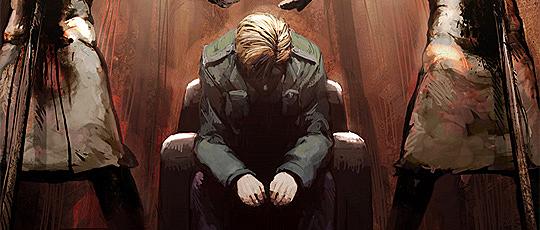The trailer for the latest Silent Hill instalment to come from Konami filled me with a rare kind of glee. However, I haven't played a Silent Hill game since Homecoming and haven't completed one since the The Room and it made me wonder why I still get excited about the franchise. The series has seen Akira Yamaoka mutate from music director to music god to game producer, but has now left the nest to join Grasshopper games, so it is certain that his iconic and atmospheric music will not be gracing the eighth entry. The music from the trailer sounds sterling though and while an unabashed fan of his music for Silent Hill, I didn't greet the news of him leaving Konami and the franchise with anything more than a "huh".
I had of course fallen out of love with the games long ago, but remained in love with the idea of Silent Hill, the games were simply a vehicle for that and an increasingly poor one. Arguments can be made about the clunky controls or the story but the concept of a town that mirrors the darkest and most primal thoughts of its inhabitants, twisting and torturing them is utterly sublime because it's psychological rather than physical terror, one that sticks in the mind and crawls under the skin. Suffice to say the franchise had hooked me early on and it now seemed I was at the behest of it regardless of my conscious feelings otherwise.
It's rare that a series can do that because it is essentially obviating common sense, sneaking around reason and savaging the pleasure centres. Often times it can happen completely unexpectedly as I found out while Ghost in the Shell: Standalone Complex was airing. I watched untranslated releases - obviously with no hope of decoding the complex political dialogue - and contributed entire episode summaries; I ordered all of the special-edition DVDs and was ankle deep in tachikoma models and tat emblazoned with the Section 9 logo; I own the two summary "movies" despite being in possession of both series already. The series had gripped me and not let me go, I was a hostage to its whims.
Which is essentially what Stockholm syndrome is: when captives develop a strong emotional attachment to their captors. Not to denigrate the ordeal that hostages go through, but many of the triggers thought to lead to the psychological effect can be loosely applied to the situation I find myself in. What kind of process is undertaken that allows for this kind of affliction to occur? In some sense it can almost be seen as an addiction, for while Stockholm syndrome predicates being an unwilling hostage, addiction is a wanton urge to indulge in something - often at the expense of other things - which produces a pleasure response.
Addiction seemed too extreme a label for what I was experiencing though, the term usually has negative connotations for its detriment on some part of the individual - a reduced bank balance certainly wasn't it. In a way it seemed like a conditioned response: popularised by Ivan Pavlov it is (simplistically) when a physical or emotional response is stimulated through some other means, in the original experiment the dogs salivated not only when their food was being made, but when the person who usually made it was present.
It seemed plausible when I had spent many an hour engrossed in Silent Hill and GITS:SAC, it was certainly possible that the excitement and thrill of experiencing these series could be primitively triggered. This would make sense given the length of time it anecdotally takes for conditioning to wear off - if there wasn't any squandering or abuse of the franchise then there would not be a strong enough cause to break one's programming. In reality however it is likely none of the above, all too specialised or grandiose to be applied to a moment of glee when seeing a new entry in a familiar franchise.
More likely it's simply hope or anticipation, that a once great or populous series could come out of the doldrums and justify the time spent in adoration - far harder is it to see a series slip into confused mediocrity than to precipitously burn out. Inertia is a difficult force to overcome when there is such ready availability.
Or perhaps I'm just overthinking this and the next instalment of Silent Hill will in fact be a return to form. I mean, it can only get better, right?
